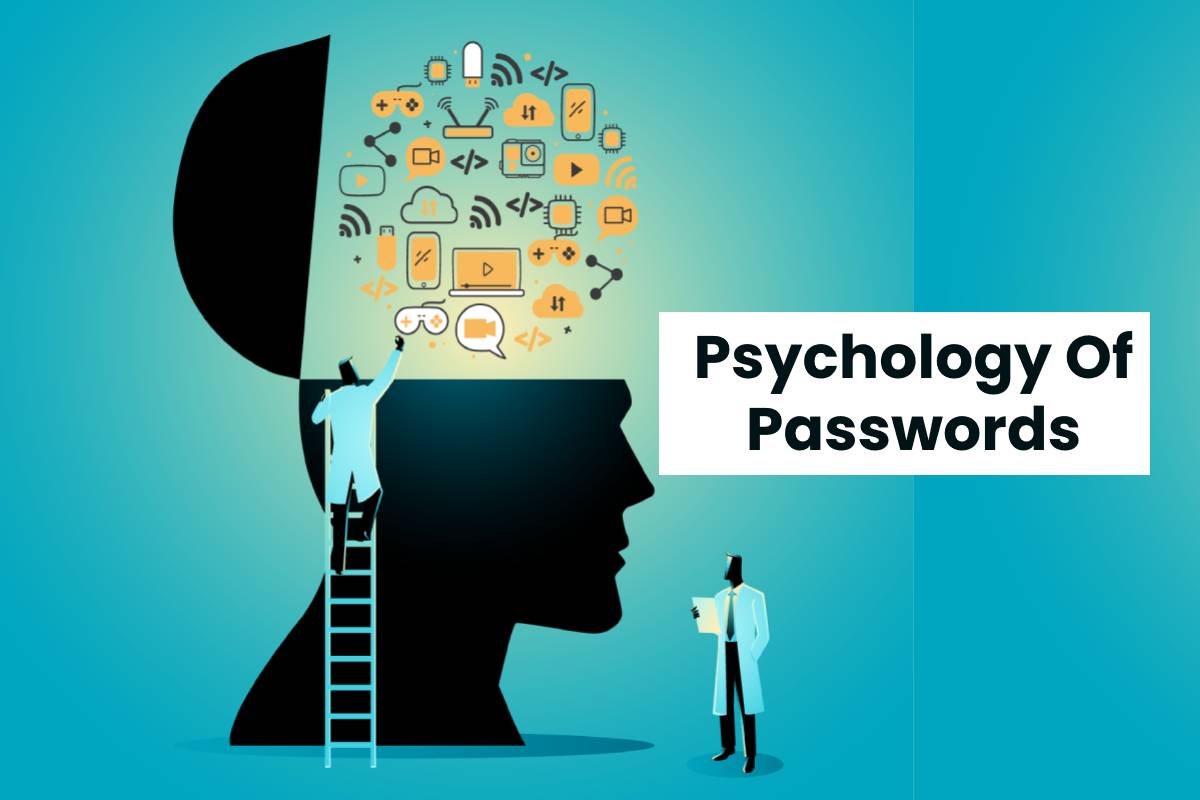

The Psychology Behind Your Password Choices
Psychology Of Passwords
Ever noticed how most people only need one key to get into the whole house? Google found that about 65 % of folks reuse the same password across multiple accounts. That’s a risky move—just like sharing a key for your front door, office, car, and locker. If a thief cracks one door, they’re poking around in every other room.
Why Do We Do It?
It turns out the answer lies right in our brains. The way we think about passwords is called password psychology. Below we break it down and answer the questions most people ask.
What Is Password Psychology?
It’s the study of how our thoughts, habits, and emotions shape the way we create, remember, and reuse passwords. Think of it as a behind‑the‑scenes look at the mental shortcuts our brains take to make life easier—sometimes at the cost of security.
Common Forces at Play
- Convenience: “One password is simpler—no memory palace needed.”
- Habit: “I’ve used this one for years; why change something that’s working?”
- Fear of Forgetting: “If I use a complex password, I’ll lose it.”
- Repetition as a Memory Aid: “The more I use it, the easier it sticks.”
Common Questions About Password Psychology
Question 1: What Constitutes a Strong Password?
A strong password is like a well‑guarded vault:
- Length: 12 characters or more.
- Complexity: Mix of uppercase, lowercase, numbers, and special symbols.
- Uniqueness: No obvious patterns or repeated words.
- Unpredictability: Randomly generated or at least highly random.
Question 2: Why Do We Reuse the Same Passwords?
Our brains are wired to favor cognitive ease. Switching between many different keys is a pretty heavy mental load. Reusing saves us the mental tally of “what did I choose for bank versus streaming service?” Yet, that convenience opens a single door for attackers.
Question 3: What Are the Best Ways to Store Passwords?
- Password managers: Store everything in one encrypted vault—no more “I wrote it down on a Post‑It.”
- Secure notes: If you’re on the no‑software side, use built‑in encrypted storage on your device.
- 2FA + strong passwords: When the password itself is weak, a second factor is your backup guard.
Question 4: How Often Should You Change Passwords?
Security guidelines are a bit like keeping fresh out of the fridge:
- Change if you suspect a breach.
- Every 6–12 months for high‑risk accounts (banking, healthcare).
- Occasional changes for less critical ones—no need to sweat every time.
How Password Psychology Is Evolving
With every new hack, the psychology shifts. People are learning that:
- They can’t live with a single key.
- Tokens and biometrics feel less “to do” and more trustworthy.
- The brain starts preferring systems that handle the heavy lifting—password managers in particular.
Ultimately, it’s about balancing the human desire for easy life‑work hacks with the real need to lock away the digital equivalent of your keys. Keep the vault locked, folks!
What is Password Psychology?
What the Heck Is “Password Psychology”?
In plain English: It’s the science of why we pick certain combos of letters, numbers, and emojis for our online guardian bars.
Why It Matters
- Choosing the Right Key: Ever wonder why you keep resetting that password that feels like a fortune cookie? This field dives into why those “unique” choices work (or sabotage) security.
- Remembering Without Rewriting: Forgetting passwords is the ultimate rabbit hole. Researchers hunt for tricks that keep the string in your mind—without needing a sticky note or a silly mnemonic.
- Security: The Tight‑Knit Crew: Password psychology assesses how sneaky the weak links are and how tough they can be against the hacker mob.
- Convenience vs. Chaos: It walks the line where you can actually use a password without pulling your hair out, yet still keep your digital life lock‑down.
What Our Spark of Curiosity (Research) Looks Like
- Human Hackers & Their Tricks: Looking at how folks are lured into phishing and credential stuffing.
- Memorability Tests: Surveys and lab experiments that gauge which patterns stick in the brain.
- Psychometric Profiling: Understanding how personality types influence password smarts.
- Next‑Gen Passwords: From patterns to passphrases, even voice‑based passwords.
Bottom line: “Password Psychology” uncovers the human side of a typically tech‑heavy topic—balancing safety, ease, and the quirky memory hacks we all secretly hate to admit.
What Are the Common Questions about Password Psychology?
Password Psychology Unpacked
Here, we’ll dig into the most talked-about topics that explain why you pick the passwords you do—because, let’s face it, your login habits are oddly interesting.
Question 1: What Constitutes a Strong Password?
How to Craft a Password That Won’t Be a Guest at Your Own Security Party
Remember the last time you set up a profile on a site or app? If you’re like most of us, you probably had to do a quick mental gymnastics routine to meet the password requirements: a mix of upper‑case letters, lower‑case letters, numbers, and a dash of special characters. That’s because most sites want a password that looks like a puzzle rather than a secret diary entry.
Why the Rulebook Exists
- Upper‑case & lower‑case letters—think of them as the vowels and consonants of your password speech.
- Numbers—because who doesn’t love a bit of math in their daily life?
- Special characters—like
!@#$%^&*—add that extra spice that keeps lasers from recognizing the pattern.
And the Goal of the Perfect Password
Picture your ideal password as a truly random string—one that doesn’t make sense and doesn’t reveal any personal info about you. Think of it like a secret handshake that only you and your computer know.
So next time you’re prompted to choose a password, remember this:
- Mix it up—your password should feel like a scramble, not a song.
- Keep it random—no birthdays, pet names, or “password123.”
- Make it hard to guess—use that special character artillery.
And voilà! You’ve got a password that’s as strong as a superhero’s shield and as unpredictable as a cat on a keyboard.
Question 2: Why Do We Reuse the Same Passwords?
Why Juggling 100 Passwords Feels Like Herding Cats
Ever heard that an average internet user owns a whopping 100 online accounts? That’s a lot of passwords to keep track of—roughly one for every social media profile, streaming service, bank account, and that secret recipe blog you secretly follow.
The Password Buffet
Imagine sitting at a salad bar where each platter is a different username and each dressing is a highly secure, randomly generated password. How do you remember which dressing belongs to which platter? Without a cheat sheet, it quickly turns into a logistical nightmare.
The Pit‑Stop for Reusing the Same Password
Some people whisper, “One long, complex password is all you need—just copy and paste it everywhere.”
- They think it saves time.
- They believe it’s safer because it’s strong.
- They’re only accounting for one point of failure.
A Hacker’s Dream
If a cyber‑intruder cracks that one password, they’re basically staring through a keyhole that opens onto every door. One is enough to walk into your online bank, your email, your streaming account, and frankly, your future secret pizza topping preference.
Time for a Better Approach
Forget the one‑password-fits‑all mantra. Here’s the playbook for staying safe while keeping your sanity:
- Use a password manager—it stores and auto‑fills all the complex passwords so you only have to remember one master key.
- Activate two‑factor authentication (2FA) wherever possible; it’s like having a second lock on your front door.
- Pick a unique passphrase for each account—a memorable sentence that’s tough for bots to guess but easy for you.
- Don’t reuse passwords across sensitive accounts; treat them like VIP tickets to different exclusive clubs.
Bottom Line: Protect Each Login Like a Legendary Treasure
With these simple tactics, you’re not letting any savvy hacker enjoy a free pass to your digital kingdom. Keep your passwords distinct, store them securely, and add that extra layer of 2FA. Then you can finally stand back and say, “Yep, I can afford to have 100 accounts—and I have the tools to keep them all safe.”
Question 3: What are the Best Ways to Store Passwords?
Passwords: Why They’re Like Your Secret Sauce
Think of every password as a tiny, mischievous sauce packet that keeps your digital life safe. We all want them comforting, but nobody wants a pantry full of recipe cards that could vanish at the slightest bump.
The Note Snitch Problem (Paper Passwords)
Deciding to jot every password down on a sticky note or a Post‑It is like choosing a paper map in a GPS‑world. Sure, you carry them with you, but when a coffee spills or a colleague finds the sheet, you’re left with a salami‑scented vault.
Paper, Yet…Not the Superhero
Paper’s charm is nostalgia, not security. A single misplaced sheet is the digital equivalent of a missing Wi‑Fi hotspot in a cafe. The “comfort” that feels always in your pocket is actually a false promise.
Enter the Digital Superhero: Password Managers
These tiny apps are like the superhero squad that keep all your passwords locked in a single, fortified bunker—a master password is the bill of entry. They encrypt every secret so only you have the keys.
What Are They, and Why They’re Cool?
- They store your login details in a single vault.
- They auto‑fill passwords, saving you a click the next time you visit a site.
- They generate strong, random passwords for you—no more “123456” or “password” mistakes.
The Secret Weapon: Master Password & Encryption
That master password isn’t just a simple entry—it’s the only line of defense against everyone else. On top of that, modern managers encrypt everything at rest and in transit, meaning even the database provider can’t peek in.
Extra Armor: Two‑Factor, Biometrics, etc.
Need an extra layer? Many managers support 2FA, fingerprint or facial recognition, and even security questions that sync across devices. Think of it as a double‑lock system, followed by a guard dog.
Browser Buddy or One-Hand, One-Click?
Your browser—Chrome, Firefox, Edge—has built‑in password managers that ease the grind. But they’re often more “comfortable” than “impervious.”
Built-in but Not Ironclad
- It’s convenient—no extra app installation.
- It’s easy to keep track of logins.
- But the security level is usually lower than dedicated managers.
Should You Trust the Browser or Password Manager?
For casual use, a browser manager might suffice. For anything beyond, especially if you’re storing sensitive business credentials, a standalone manager is the safer bet.
Bottom Line: Choose Smart, Stay Secure
Never trust a paper note as your digital lifeline. Opt for a password manager with a rock‑solid master password, encryption, and extra security options. And if you do use a browser’s built‑in manager—closely monitor who can access it and keep your main password vivid. Your digital world deserves a hero, not a paper trail.
Question 4: How Often Should You Change Passwords?
The Myth of the Eternal Password
Ever thought you could set a password and never touch it again? Think again! The online world’s not your grandma’s attic—it’s more like a buzzing beehive of clever cyber‑villains.
Why a “Forever” password is a recipe for disaster
- A hacker’s patience: Unlike a pickpocket who steals on a single cue, cyber‑criminals will stalk your account like a paparazzo over a long haul.
- Stealth mode: They might quietly log your every click, sipping data over months. You? You’ll only catch the damning evidence when it’s too late.
- Brute‑force roulette: If a hacker is after your vitals, they’ll try every combo—like a drunken bartender guessing a secret cocktail recipe.
Why a little password rotation keeps the bad guys at bay
- Disrupt the stalker: A fresh password throws off anyone who’s been quietly watching your cart or messages.
- Break the brute‑force battery: Keep changing, and you’re turning a quick “guess‑and‑fail” into a marathon that they’re not built to endure.
- A safety net for the future: Even after a hack, the best‑case scenario is you’re in control before they can fully corrupt your data.
Pro tip: Treat your password like a gym workout
Just as you’d go to the gym semi‑regularly, give your password a change every 6 months—or sooner, if you suspect a breach.
Remember: in the digital jungle, a static password is as alluring to a hacker as an open picnic basket to a hungry lion.
How Password Psychology is Evolving?
Remember When Bill Gates Banned Passwords?
Back in 2004, Bill Gates famously tossed the idea of old‑school text passwords into the bin, predicting that they’d soon be history. One might have thought he’d be right, but guess what? We’re still typing those alphanumeric combos—though we’ve spruced them with a host of new safeguards.
Modern‑Day Password Survival Kit
- Two‑Factor Authentication (2FA): A second link of proof. Your phone, a code, a tiny nudge to double‑check before you’re let in.
- Captcha‑Assisted Logins: “What’s a duck doing in a hat?” My go‑to sanity test—I’ve gorged on those for years.
- Biometric Login: Fingerprints, facial scans, voice prints—because who wants to remember a password when they can tap one’s own skin?
What the Modern Password Psychologists Are Chewing on
- Rethinking the password reality: Are we still stuck in a “memorize a string” phase?
- Pinpointing user pain points when it comes to passwords. Want a quick tip? Most users doom themselves to weak passwords because they’re easier to remember.
- Decrypting the new cyber threats that emerge from the current password trends—where hackers are playing Bitcoin with stolen creds.
So, while Bill Gates tried to slap a curb on passwords, the tech world is far from quitting on them. Instead, we’ve evolved a security cocktail that turns the ancient lock into something akin to a superhero lineup—only minus the cape.







